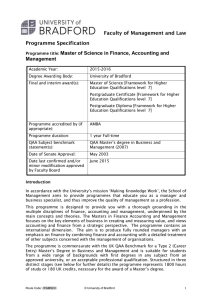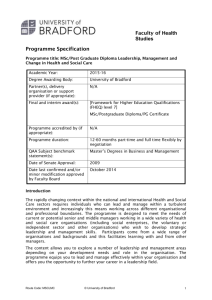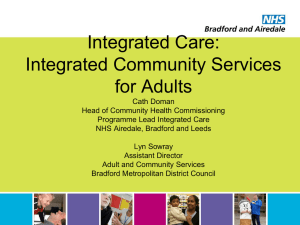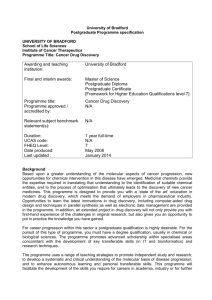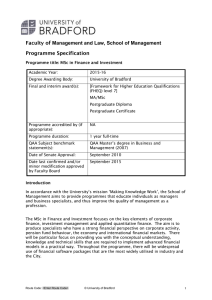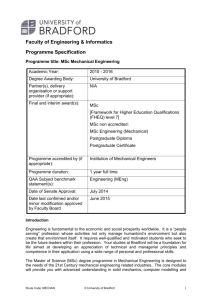Postgraduate Certificate in Leading Service
advertisement
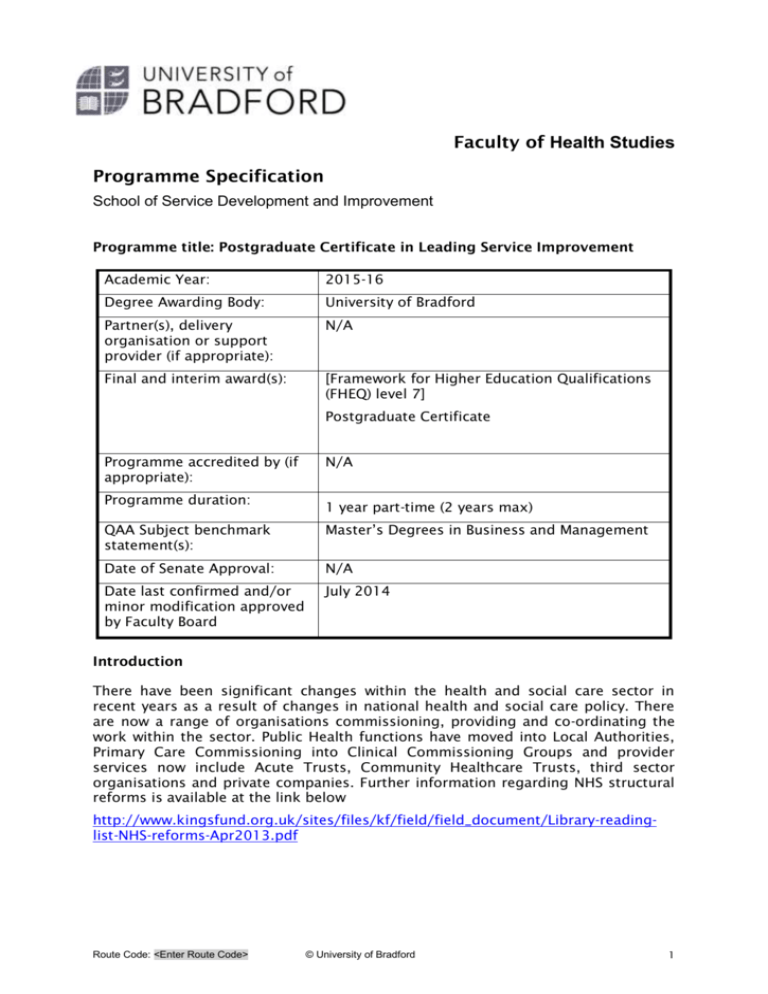
Faculty of Health Studies Programme Specification School of Service Development and Improvement Programme title: Postgraduate Certificate in Leading Service Improvement Academic Year: 2015-16 Degree Awarding Body: University of Bradford Partner(s), delivery organisation or support provider (if appropriate): N/A Final and interim award(s): [Framework for Higher Education Qualifications (FHEQ) level 7] Postgraduate Certificate Programme accredited by (if appropriate): Programme duration: N/A 1 year part-time (2 years max) QAA Subject benchmark statement(s): Master’s Degrees in Business and Management Date of Senate Approval: N/A Date last confirmed and/or minor modification approved by Faculty Board July 2014 Introduction There have been significant changes within the health and social care sector in recent years as a result of changes in national health and social care policy. There are now a range of organisations commissioning, providing and co-ordinating the work within the sector. Public Health functions have moved into Local Authorities, Primary Care Commissioning into Clinical Commissioning Groups and provider services now include Acute Trusts, Community Healthcare Trusts, third sector organisations and private companies. Further information regarding NHS structural reforms is available at the link below http://www.kingsfund.org.uk/sites/files/kf/field/field_document/Library-readinglist-NHS-reforms-Apr2013.pdf Route Code: <Enter Route Code> © University of Bradford 1 This has resulted in greater emphasis on an integrated approach to service improvement. The Postgraduate Certificate in Leading Service Improvement has been designed to meet the needs of leaders and managers, including those in newly created roles, who wish to develop knowledge and skills which will enable them to lead sustainable service improvement initiatives within their own organisation and across the wider system of health and social care. This programme will be relevant to commissioners, service providers and those who co-ordinate health and wellbeing networks including the third sector and its development has been informed by the NHS Healthcare Leadership Model, the national benchmark for effective leadership skills and behaviours (more information available at; http://www.leadershipacademy.nhs.uk/resources/ The programme provides opportunities for multi-disciplinary learning across a range of health care organisations. Learning and assessment is directly related to service improvement opportunities and challenges identified by participants. A blended learning approach has been taken which allows students to combine real time learning with their roles in the sector. Modules can also be studied as standalone modules for participants not wishing to undertake the whole programme. The team have extensive experience in delivering leadership and management development and have a background of publications and research. Places are currently funded through Health Education Yorkshire and Humber (HEYH) for employees falling within the scope of HEYH. The Programme Leader will be happy to provide advice regarding possible funding to potential applicants. Some key aspects of the programme are A post graduate programme which meets the professional and academic needs of individuals wanting to develop their knowledge and skills in leading service improvements. A programme that is delivered in block sessions and supported by a Virtual Learning Environment to fit in with increasingly busy working lives. Opportunities for multi-disciplinary learning across a range of health and social care organisations including third sector. Modules which can be selected for study as stand-alone modules. Programme Aims The programme is intended to: A1 Develop a critical understanding of the changing strategy and policy context in the health and social care sector A2 Provide an opportunity for participants to review their own practice within their organisation and others within the partnership context A3 Enable participants to lead service improvement in the health and social care sector A4 Provide opportunities for inter-professional and inter-organisational learning Route Code: <Enter Route Code> © University of Bradford 2 Programme Learning Outcomes To be eligible for the award of Postgraduate Certificate at FHEQ level 7, students will be able to: LO1 Identify and critically analyse government policy and strategy in relation to the work of the health and social care sector. LO2 Critically analyse theory in relation to; quality management, leadership, managing people, sustaining service development and improvement. LO3 Demonstrate development of skills in the following areas: quality management, leadership, managing people, sustaining service development and improvement. LO4 Critically evaluate practice in relation to service delivery and plan for improvement. LO5 Critically reflect on current continuing development. LO6 Demonstrate ability to manage complex issues and solve problems. LO7 Apply critical thinking and analysis. professional practice to recognise Curriculum Postgraduate Certificate FHEQ Level Module Title Type (Core/ Option/ Elective) Credits Semester (s) Module Code 7 Leadership Theory and Practice Core 30 1 HH4018T 7 Quality and Service Improvement Core 30 2 HHM708T Students will be eligible to exit with the award of Postgraduate Certificate if they have successfully completed 60 credits and achieved the award learning outcomes. Learning and Teaching Strategy The teaching, learning and assessment strategies are designed to allow you to achieve the programme learning outcomes. The teaching in all modules aims to integrate theory with application of your knowledge within organisations to enable you to develop your effectiveness as a leader of service improvement. Learning outcomes are developed through a series of contextualising lectures, workshops and group tutorials that cover key topics and provide students with the opportunity to discuss and analyse the topics and to improve problem solving skills. A feature of this programme is a focus on analysis of own practice and planning to further Route Code: <Enter Route Code> © University of Bradford 3 develop this practice in order to better meet the needs of patient’s, providers, organisations and commissioners. Learning outcomes will also be addressed using directed study to enable you to develop and expand your knowledge and analytical skills by undertaking guided reading and by preparing for presentations and discussions in the workshops. Support from the module leader will be available which you can access face to face, via the phone, by email or other virtual contact (e.g. Skype). The virtual learning environment (VLE) will be used extensively to complement the other learning and teaching methods used within the programme and to support and direct you in your studies. The current VLE platform used is Blackboard. The VLE will include material developed for your programme, relevant contemporary web sites and a range of on-line resources such as audio/video files. You will be expected to use the VLE facility and support will be available to help you do this. Assessment Strategy All assessments are of an applied nature where you will be able to contextualise your assessments to areas of current relevance to your practice. Learning outcomes are assessed through written assignments (LO1-7). For all assessed work you will be able to submit work prior to the final submission date and receive formative feedback. Assessment Regulations This Programme conforms to the standard University Regulations which are available at the following link: http://www.bradford.ac.uk/aqpo/ordinances-and-regulations/ Admission Requirements The University welcomes applications from all potential students and most important in the decision to offer a place is our assessment of a candidate’s potential to benefit from their studies and of their ability to succeed on this particular programme. Consideration of applications will be based on a combination of formal academic qualifications and other relevant experience. The standard entry requirements for the programme are as follows: The University welcomes applications from all potential students regardless of their previous academic experience; offers are made following detailed consideration of each individual application. The decision to offer a place is based on our assessment of a candidate’s potential to benefit from their studies and of their ability to succeed on this particular programme. Whilst you will normally hold a first degree or professional qualification we will consider your application if you do not possess such a qualification but have appropriate work experience. Students can enter the programme at either September or January entry dates. Applicants whose first language is not English will need to demonstrate proficiency in English in accordance with University Regulations. For example in the Route Code: <Enter Route Code> © University of Bradford 4 International English Language Testing System (IELTS) you will need to achieve an overall band of at least 6.0, with at least 5.5 in each of the four sub-tests. Applicants with a score below 6.0 will be directed towards obtaining further development from various University / international language support services. If you have prior certificated learning or professional experience which may be equivalent to parts of this programme, the University has procedures to evaluate this learning in order to provide you with exemptions from specified modules contained within the curriculum. Please talk to us if you do not fit the standard pattern of entry qualifications. Applications are welcome from students with non-standard qualifications or mature students (those over 21 years of age on entry) with significant relevant experience. Recognition of Prior Learning If applicants have prior certificated learning or professional experience which may be equivalent to parts of this programme, the University has procedures to evaluate and recognise this learning in order to provide applicants with exemptions from specified modules or parts of the programme. Further Information: For further information, please check the University prospectus or contact Admissions. The Admissions Office The Admissions Office The University of Bradford School of Health Studies Richmond Road The University of Bradford Bradford, BD7 1DP Richmond Road UK Bradford, BD7 1DP UK +44 (0)1274 233054 +44 (0)1274 236367 http://www.brad.ac.uk/courses/ http://www.brad.ac.uk/acad/health/ The contents of this programme specification may change, subject to the University's regulations and programme approval, enhancement and review procedures. Version Number Brief description of Modification Date of Approval (Faculty Board) 1 Route Code: <Enter Route Code> © University of Bradford 5 Route Code: <Enter Route Code> © University of Bradford 6

